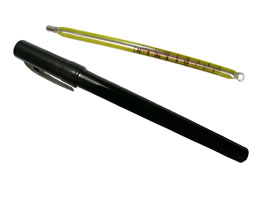
Every parent dreads waking up in the night with a sick baby. As most parents know, taking a squirming baby's temperature can be challenging. But it's one of the most important tools mothers and doctors have to determine if a baby has an illness or infection. The best and most accurate method for the squirming baby is to take your baby's temperature rectally. We prefer the old fashioned glass baby rectal thermometer. This one is beefy and 5" long for larger babies. They are inexpensive, low maintenance and don't contribute exhausted batteries or other electronic discards. We recommend taking large babies tempertures at least every week and anytime they are fussy.
To take a rectal temperature: Before becoming parents, most people cringe at the thought of taking a rectal temperature. But don't worry — it's a simple process:
- Lubricate the tip of the thermometer with a lubricant, such as petroleum jelly.
- Place your child:
- belly-down across your lap or on a firm, flat surface and keep your palm along the lower back
- With your other hand, insert the lubricated thermometer into the anal opening. You will need to insert it a little farther for an adult sized baby, about 1 ½ inches. Be sure the thermometer is well lubricated and insert it very gently and slowly. Stop if you feel any resistance.
- Steady the thermometer between your second and third fingers as you cup your hand against your baby's bottom. Soothe your child and speak quietly as you hold the thermometer in place.
- Wait aproximately 4 minutes so that the temperature is ready to be read. Write down the temperature, noting the time of day that you took the reading.
- Repeat this process every 2 hours if you determine your baby has a temperature or twice a day otherwise.
